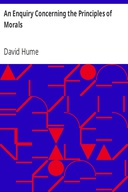Explore
An enquiry concerning the principles of morals
David Hume and Tom L. Beauchamp
1957-2010
1 Ungluer has
Faved this Work
Login to Fave
About Hume David Hume (1711-1776) is one of the greatest of philosophers. Today he probably ranks highest of all British philosophers in terms of influence and philosophical standing. His philosophical work ranges across morals, the mind, metaphysics, epistemology, and aesthetics; he had broad interests notonly in philosophy as it is now conceived but in history, politics, economics, religion, and the arts. He was a master of English prose. The Clarendon Hume Edition General Editors: Professor T. L. Beauchamp, Georgetown University, USA, Professor D. F. Norton, McGill University, Canada, and Professor M. A. Stewart, University of Lancaster, England The Clarendon Hume will include all of his works except his History of England and minor historical writings; it will be the only thorough critical edition, and will provide a far more extensive scholarly treatment than any previous editions. This edition (which has been in preparation since the1970s) offers authoritative annotation, bibliographical information, and indexes, and draws upon the major advances in textual scholarship that have been made since the publication of earlier editions--advances both in the understanding of editorial principle and practice and in knowledge of thehistory of Hume's own texts. The Edition will comprise: Volumes 1 and 2: A Treatise of Human Nature, edited by D. F. Norton Volume 3: An Enquiry concerning Human Understanding, edited by T. L. Beauchamp Volume 4: An Enquiry concerning the Principles of Morals, edited by T. L. Beauchamp Volume 5: The Natural History of Religion and the Dissertation on the Passions Volumes 6 and 7: Essays Volume 8: Dialogues concerning Natural Religion and other posthumous publications, edited by M. A. Stewart About this work An Enquiry concerning the Principles of Morals was Hume's third great philosophical work, first published in 1751. Hume's aim in this elegant and lucid work was to present in an accessible way his theory of the foundation of morality in human nature, which had developed significantly since hefirst addressed the subject in the Treatise of Human Nature (1739/40). He discusses moral psychology; freedom, necessity, and causation; practical reasoning; justice; virtues and other moral qualities. He considered this Enquiry to be 'of all my writings, historical, philosophical, or literary,incomparably the best'. About this volume The authoritative version of the text, based upon the 1772 edition that was seen through the press by Hume himself, is presented here accurately and clearly. The editor's introduction sets the work in its historical context; the annotation and glossary provide information about Hume's sources,allusions, citations, and meanings, to help readers towards a full understanding of the text. A biographical appendix identifies the many people mentioned by Hume in the Enquiry. Bibliographies list the works cited by Hume and a selection of the secondary literature. Hume's original index isreproduced, together with a new general index by the editor.
This book is included in Project Gutenberg.
Why read this book? Have your say.
You must be logged in to comment.

